Access free Georgia divorce records conveniently via various search methods.
Obtaining these records, which contain information about the legal separations in the state, is possible for members of the public per the state’s Open Records Act and the federal Freedom of Information Act (FOIA).
Divorce records contain information about separation cases and other matters like child support, division of assets, and alimony. Discover how to efficiently find divorce certificates and decrees in Georgia via the guidance offered in this streamlined resource.
Who Can Access Divorce Records in Georgia?
Divorce records provide essential details related to the termination of matrimony, making them a crucial resource for legal, and personal purposes.
Courtroom proceedings in Georgia are public documents under O.C.G.A. § 31-10-25 (a) and (f).1 Nevertheless, if individuals prefer to keep the annulment information confidential, they can file a divorce out of court or ask for the sealing of the official records.
The sealed records are not accessible to the general public in Georgia.
In Georgia, divorce records are tricky to obtain online because of their sensitive nature. They contain delicate issues such as sexual harassment, financial information, child custody, etc. It, therefore, turns out that they are harder to locate on the internet than any other records of a similar nature.
In addition to that, third party websites can be helpful for free public divorce records searches.
The divorce index can be obtained in the form of a certified document copy, which confirms that the separation is valid. Usually, these records are required for various official purposes such as name changing, remarrying, adoption, financial matters, immigration, insurance policy, etc.
For a more detailed examination of Georgia’s divorce trends, it is advisable to explore the latest records. To access the specific data, consider searching for Georgia divorce rates on the CDC website.2 Georgia’s marriage rate is 5.5 per 1,000 persons, while the divorce rate is 2.2 per 1,000 individuals.
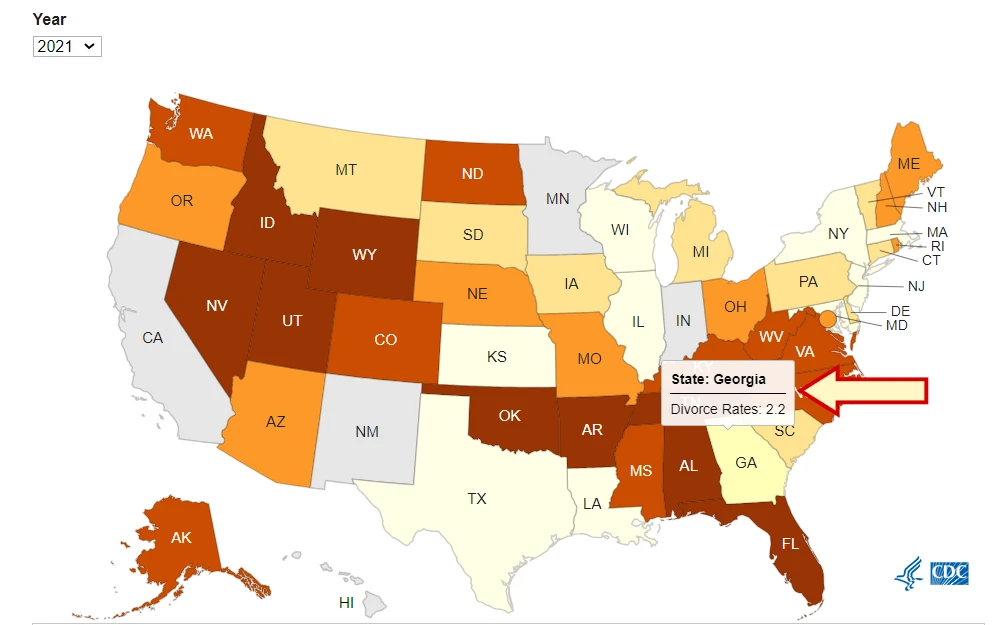
These figures offer a snapshot of the state’s commitment trends, revealing both the frequency of new marriages and the prevalence of divorces within the population.
How To Check Out Georgia Divorce Records (Free)
Searching for records related to divorce is a crucial tool for those seeking information on such cases.
First of all, record inquirers need to decide where to look for records prior to 1953 and after 1996. Then, they should contact the probate court in the county in which the couple got married, and they can give access to these particular records.
In addition, the registrant, immediate family members, or any legal representative are the only ones who qualify to request divorce, and birth certificates because this is meant to ensure privacy, and correct application of vital records.
For the application of a divorce record, searchers are required to have all the necessary information. This usually captures major information, like the names of the parties in the divorce case, the date of the separation, and the place where the dissolution took place.
Also, applicants will need to provide a photocopy of the valid photo ID to ensure their authenticity. Acceptable forms of photo ID include:
- An unexpired or recently expired (within one year) Georgia Identification card.
- An employer ID card.
- A DMV ID card.
- A school, university, or college ID card.
- A U.S. Veterans Identification or Military Identification card.
- A debit card with a photo.
- A Consulate Card.
- Georgia driver’s license or a driver’s license issued by another U.S. state or territory.
- Department of Corrections ID card.
- A U.S. Passport or a foreign passport.
- A new Georgia weapons carry license.
A prepayment is essential to conduct a record search or verification in the state of Georgia. Such payments, and fees are typically non-refundable upon rendering of service. Requesters will receive the documents via first-class mail, and the cost of a certified copy for the search includes a fee of $10.00.
In addition to that, certificates of the same record are charged at $5.00, when requested for at the same time.
To conduct a search, payment can be made via check, money order, or by mail. For in-person requests, payment can be made either by check, cash, credit card, or debit card.
When record seekers have the required documents and have completed the Georgia Department of Public Health request form, they can then choose the best method to make the request. There are three options for requesting vital records, which include requesting online, by mail, or in person. If they choose to go online, they can place their order through one of the approved vendors.
Searchers may also place vital records requests by mail, submit a completed copy of the relevant dissolution of marriage request form, and make payments to this address:
State Office of Vital Records
1680 Phoenix Boulevard, Suite 100
Atlanta GA 30349
Phone: (404)679-4702
The Atlanta State Office of Vital Records takes around 8-10 weeks to respond to the mail. People who need it on the same day can request it in person from the State Office of Vital Records or any County Vital Records Office during regular business hours from 8:00 AM to 4:00 PM, Monday to Friday (excluding state holidays).
Obtaining Divorce Records Through Counties & Cities in Georgia
Checking with custodians at the county or municipal level could prove beneficial in obtaining divorce records. Requests may have county-level advantages like individual assistance, focused help, or online search possibilities that are not available at the state level.
Fulton County – has an online search tool to look up all Fulton County divorces on the County Clerk of Superior Court website. For in-person or mail requests, individuals can go to the following address:
Fulton County Courthouse
136 Pryor Street
Atlanta, GA 30303
Phone: (404)613-5313
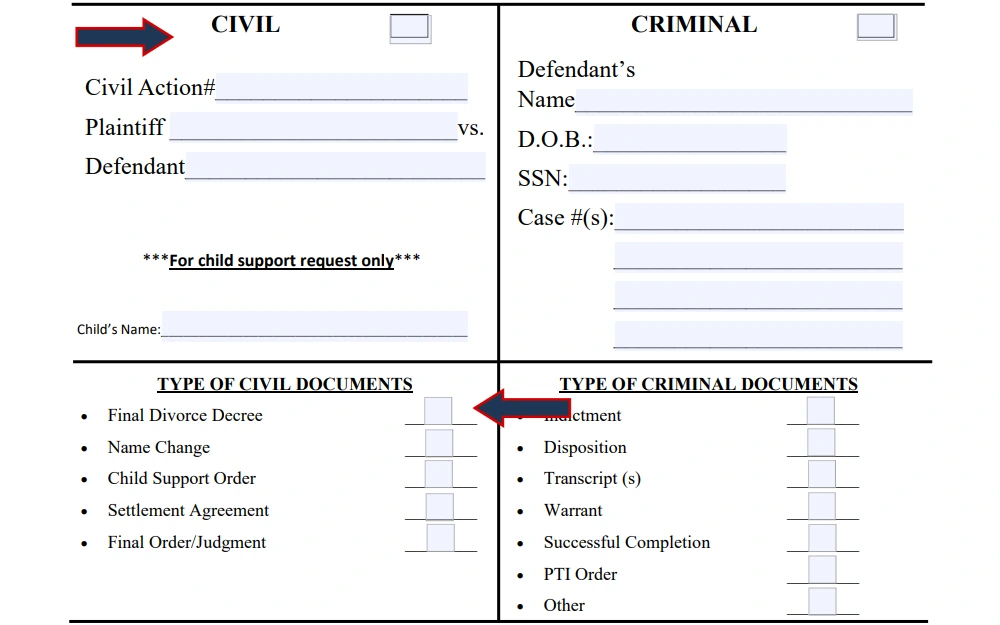
According to the respective counties, a person can submit a city-level request in Atlanta to the Fulton County Clerk of Superior Court.
The fees for checking records varies based on the type and certification level, ranging from $0.50 per page for uncertified copies to $2.50 for copy-certified or exemplified first pages, with additional charges for subsequent pages or specific formats such as electronic copies or oversized drawings.5
Gwinnett County – also offers access to county-wide divorce records through the County Vital Records Office webpage, indicating fees, forms to obtain reports of dissolution, and contacts. People can also make in-person requests at the following address:
Gwinnett County Clerk
75 Langley Drive
Lawrenceville, GA 30046
Phone: (770)822-8100
Cobb County – provides access to local divorce records through the County Clerk of Superior Court, which enlists fees and forms as well.
The county-level options will give plenty of information and resources.
The cost for checking records varies based on the type and certification level, ranging from $0.50 per page for uncertified copies to $2.50 for copy-certified or exemplified first pages, with additional charges for subsequent pages or specific formats such as electronic copies or oversized drawings.6
Here are a few contact details for counties in Georgia:
Fulton County Bureau of Vital Statistics
99 Butler Street S.E., 2nd floor
Atlanta, GA 30303
Phone: (404)730-1260
Atkinson County Probate Judge
PO BOX 855
Pearson, GA 31642
Phone: (912)422-3552
Cobb County Health Dept.
1650 County Services Parkway
Marietta, GA 30008
Phone: (770)514-2300
Columbia County Clerk
P.O. Box 58
Appling, GA 30802
Phone: (706)541-1254
It is important to note that the procedure for securing both certified and uncertified copies of divorce certificates varies in different counties. Record seekers may also look for other counties and their relevant websites by using this list of all county vital records offices in Georgia.
The city-level divorce records request is similar to the county-level request, except that in Atlanta, access to documents is through the Fulton County Clerk of Superior Court as noted above.
To access divorce records in Savannah, individuals can rely on Chatham County’s Clerk of Superior Court while in Augusta, searchers can rely on Richmond County’s Clerk of Superior Court.
Every city has its own procedures, and inquirers should contact the relevant clerk of the superior court or vital records office in the respective city for more details from reliable sources.
Researchers looking to conduct genealogical information gathering can consider various archives and repositories, both public and private. Many religious institutions also maintain matrimonial and divorce records that can also be accessed.
Searching Divorce Archives in GA for Genealogy & Lineage Research
When delving into genealogy and lineage research in Georgia, free divorce archives can be valuable resources.
While Georgia’s dissolution of marriage records may not be readily attainable for free, government and educational websites can provide information on where to search for divorce archives, the costs involved, and historical insights.
To begin their research, citizens can consider visiting the Georgia Archives, a government repository that houses a wealth of historical documents and records.7, 8
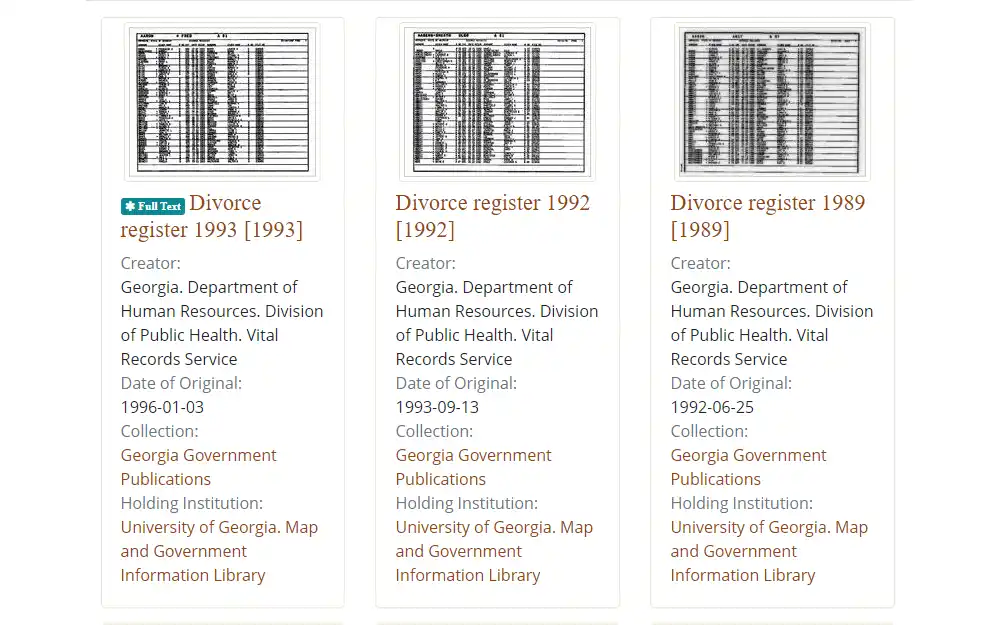
Additionally, educational resources such as the National Archives organized by state can offer guidance on accessing state archives and valuable genealogical information. These resources empower researchers to uncover family history and genealogical connections.
Georgia, involves the exploration of the various resources in an attempt to discover historical marital information. Begin with Georgia Historic Newspapers for digitized newspaper archives. Visit local religious institutions for marriage records and search educational resources such as Georgia Historical Society.
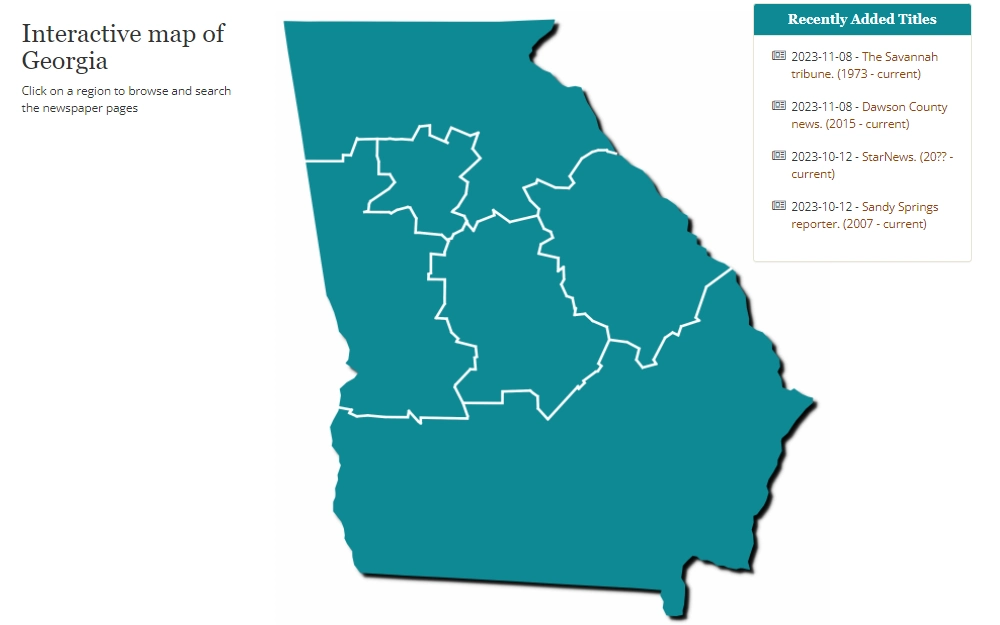
For more resources, visit University of Georgia Libraries and use Georgia Archives to see digitized marriage records. Accessing older records can be done through local county clerks’ offices such as Clerk of Superior Court Authority in Georgia.
Does Georgia Allow Common Law Marriages & Divorces?
Georgia does acknowledge common law marriages, but these marriages have specific rules.
Since January 1, 1997, Georgia has not recognized common law marriages that were formed in the state. Nevertheless, for the ones prior to this date, some conditions have to be fulfilled for them to be regarded as legally valid.
Common law marriages in Georgia before January 1, 1997, must meet the following criteria:11
- Cohabitation in a Recognizing State: The spouses should reside in a state that recognizes common law marriages.
- Protracted Cohabitation: Although the duration of cohabitation is not specified in any state law, this normally refers to a permanent, or long term arrangement.
- Public Recognition: Family, friends, and the community should recognize the couple as married. This could include sharing the same surname, filing joint tax returns, and behaving as though they are married in social and legal situations.
- Intent to Marry: There ought to be an intention to “marry” or treat the relationship as a lawful union.
However, it is worth noting that divorce is the only way to terminate common law marriages, just like formalized marriages.
How To Access Details About Dissolutions of Marriage in GA
In Georgia, record seekers opt to understand the legal landscape of marriage, common law divorce, and domestic partnership. To access such information, it is vital as Georgia law takes into consideration some marital and domestic partnership aspects.
Georgia does not normally allow common law marriages. However, it recognizes those that existed before January 1st, 1997, and those arising from other states where common law is acceptable.
For information on dissolutions of common law marriages in Georgia, individuals can consult the state’s vital records office and legal authorities. Those in common law marriages should know the features of the common law marriages in the state.
Georgia also recognizes non-marital relationships as domestic partnerships. There are several conditions to registering interested parties as domestic partners.
The rules are specific to each county and may vary between them, but some of the common criteria include:
- Six months or more in cohabitation with evidence of joint residency.
- Each party is not married nor legally separated for any reason.
- Both are adults aged 18 years or above.
- Capable of entering into a contract.
- There is an agreement between the two parties to share responsibilities and support.
- Are not blood relatives.
- They have a sole domestic partnership with each other.
- Breakdown of any existing domestic relationship that the individuals had with a third-party partner at least six months prior to the current declaration, unless the partner died.
However, some counties in Georgia – such as Fulton and Athens-Clarke – may have different residency requirements. Furthermore, the eligibility criteria may be different, and the recognition of domestic partnerships may vary depending on the county.
How To File for a Divorce & Address Divorce Petitions in Georgia
Divorce in Georgia is a complex procedure that comprises several important aspects, such as grounds and filing for separation, and answering a petition. In Georgia, spouses are allowed to either file a no-fault or an at-fault divorce, making the separation process less tedious.
Georgia provides the option of fault and no-fault basis of divorce. The spouse who wants to pursue a no-fault divorce must just indicate that their marriage is irreparably broken.
In Georgia, they recognize twelve fault-based divorce grounds, such as the ex-husband or the ex-wife’s drunkenness and the inability to perform marital duties. Comprehending the causes of the divorce is the first step in the process.
The process of filing a separation in Georgia starts with filing the official divorce papers with the Clerk of the Superior Court. The county where the person or their spouse has lived for at least half a year is where the papers should be submitted. This jurisdictional requirement makes sure that the relevant courts carry out the divorce.
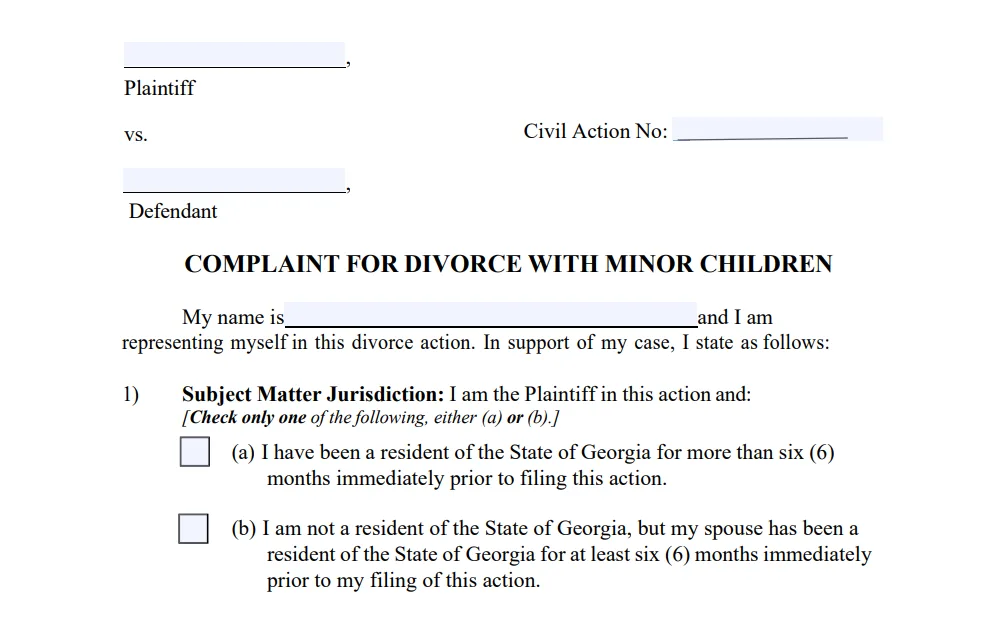
After filing the dissolution, the divorce notice needs to be delivered to the other spouse. A partner can be given thirty days to respond to the papers after receipt. A failure to act may allow a judge to enter a default judgment on a divorce.
Approved vendors include the State of Georgia’s online service ROVER, GO Certificates (a third-party vendor), or VitalChek (another third-party vendor). Online request response time is 2-4 weeks, with expedited options offered in 5 business days.
Therefore, there is a need for communication between the two parties in the maintenance of their legal obligations. Navigating the complexities of divorce in Georgia requires a thorough understanding of the required divorce forms and documentation.
This article provides all necessary details for searchers to find Georgia divorce records; for additional information on anyone in the state, you can utilize the instructions for looking up marriages in GA or search all free public records in Georgia (property taxes, arrests, warrants, crimes, court cases, and more).
References
1Justia Law. (n.d.). 2010 Georgia Code TITLE 31 – HEALTH CHAPTER 10 – VITAL RECORDS § 31-10-25 – Disclosure of information contained in vital records; transfer of records to State Archives. Retrieved November 29, 2023, from <https://law.justia.com/codes/georgia/2010/title-31/chapter-10/31-10-25>
2Centers for Disease Control and Prevention, National Center for Health Statistics. (2023, September 12). Georgia. CDC. Retrieved November 29, 2023, from <https://www.cdc.gov/nchs/pressroom/states/georgia/ga.htm>
3Centers for Disease Control and Prevention, National Center for Health Statistics. (2023, February 10). Divorce Rates by State: 2019-2021. CDC. Retrieved November 29, 2023, from <https://www.cdc.gov/nchs/pressroom/sosmap/divorce_states/divorce_rates.htm>
4Office of the Fulton County Clerk of Superior and Magistrate Courts. (n.d.). Clerk Of Superior & Magistrate Court File Request Form. Fulton County Superior Court. Retrieved November 29, 2023, from <https://www.fultonclerk.org/DocumentCenter/View/1088/File-Request-Form>
5Office of the Fulton County Clerk of Superior and Magistrate Courts. (n.d.). Fee Schedule. Fulton County Superior Court. Retrieved November 29, 2023, from <https://www.fultonclerk.org/400/Fee-Schedule>
6Cobb County Government. (n.d.). Common Probate Court Fees | Cobb County Georgia. Retrieved November 29, 2023, from <https://www.cobbcounty.org/courts/probate-court/fees>
7University System of Georgia. (n.d.). Research. Georgia Archives. Retrieved November 29, 2023, from <https://www.georgiaarchives.org/research>
8Office of the Fulton County Clerk of Superior and Magistrate Courts. (n.d.). FAQs • Fulton County Superior Court, GA • CivicEngage. Fulton County Superior Court. Retrieved November 29, 2023, from <https://www.fultonclerk.org/FAQ.aspx>
9Digital Library of Georgia, The University of Georgia Libraries. (n.d.). divorce – Digital Library of Georgia Search Results. Retrieved November 29, 2023, from <https://dlg.usg.edu/records?q=divorce&search_field=both>
10Digital Library of Georgia, The University of Georgia Libraries. (n.d.). Georgia Historic Newspapers. Retrieved November 29, 2023, from <https://gahistoricnewspapers.galileo.usg.edu/>
11Social Security Administration. (2016, August 8). POMS: PR 05605.012 – Georgia – 08/08/2016. SSA. Retrieved November 29, 2023, from <https://secure.ssa.gov/poms.nsf/lnx/1505605012>
12Judicial Council of Georgia Administrative Office of the Courts. (2022). In The Superior Court Of Sumter County. Georgia Courts. Retrieved November 29, 2023, from <https://georgiacourts.gov/wp-content/uploads/2023/06/Complaint-for-Divorce-with-Minor-Children-Form-Septmeber-2022-Update.pdf>
